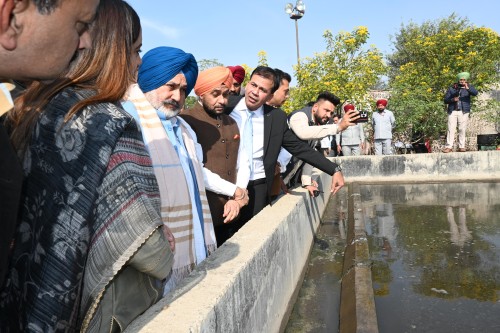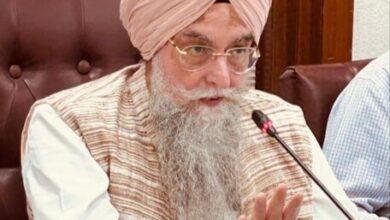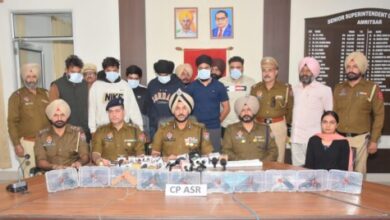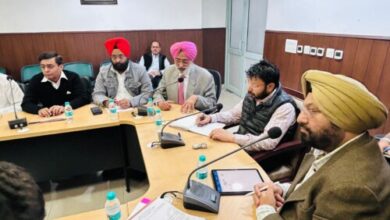Chetan Singh Jauramajra Launches Irrigation Project in Moga
"Target Set: 20,000 Hectares to Receive Treated Water Irrigation This Fiscal Year"
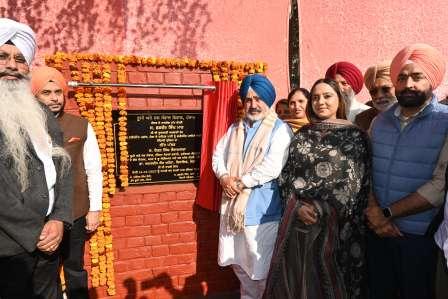
On Thursday, in honor of the Department of Soil and Water Conservation’s 54th anniversary, Punjab Soil and Water Conservation Minister Chetan Singh Jauramajra laid the foundation stone of the state’s largest irrigation project, which aims to use 27 MLD (million litres per day) of treated water from the Sewage Treatment Plant Moga. Four neighbouring villages’ agricultural fields will benefit from the project.
Speaking to the farmers following the foundation stone laying, the Cabinet Minister stated that the government, led by Chief Minister S. Bhagwant Singh Mann, has set a goal to double the usage of treated water to 600 MLD by the end of the current fiscal year, benefiting 20,000 hectares. This effort aims to prevent further depletion of underground water and lower the costs of agricultural inputs for farmers.
“To effectively address the imminent threats of desertification and water scarcity, anticipated to escalate in the state over the next 20 to 25 years at existing water consumption rates, the Minister of Soil and Water Conservation underscores the urgent necessity for the timely implementation of low-water requirements. This includes the adoption of diversified cropping patterns and the incorporation of smart irrigation techniques. The Minister accentuates the imperative to promptly carry out these measures as part of a comprehensive strategy.
“Furthermore, the Minister places a strong emphasis on the imperative to maximize the utilization of canals and actively pursue the creation of alternative surface water-based irrigation sources. These initiatives are deemed crucial, not only in mitigating the potential risks associated with depleting groundwater resources but also in ensuring sustainable agricultural practices for the future. The Minister’s directives highlight a proactive approach to safeguarding the state against the adverse impacts of climate change, promoting resource conservation, and fostering long-term resilience in the face of evolving environmental challenges.
During the event, MLA Moga Dr. Amandeep Kaur Arora shared that the treated water, which would have otherwise ended up in drains, will now guarantee year-round irrigation for over a thousand hectares of agricultural land. Additionally, the state stands to benefit from lower electricity subsidies due to a reduction in the usage of tubewells in the command area.
Expressing gratitude to the farmer community of Ajit Garh, Bukkanwala, Singhawala, and Ghall Kalan village for their cooperation in the project’s planning, she earnestly requested the department to ensure the project is completed on schedule. This collaborative effort underscores the significance of community involvement in ensuring the suc
. Devinderjit Singh Laddi Dhos, the MLA for Dharamkot, expressed gratitude to the cabinet minister and the state government for approving the project in his constituency.
The department has so far put into service 58 of these treated water irrigation projects, benefiting over 10,000 hectares of agricultural land, according to Mohinder Singh Saini, Chief Conservator of Soils, Punjab. He disclosed the project’s technical details and stated that the project, which has a total cost of Rs. 12.87 crore, is being built with assistance from NABARD’s Rural Infrastructure Development Funds.
The 1,020 hectares of agricultural land owned by 1100 farmer households will benefit from the installation of about 25 km of subterranean pipeline with diameters of 630 mm, 500 mm, 355 mm, and 200 mm. Additionally, he provided information about other farmer-focused services that the government offers to encourage the adoption of effective irrigation practices.
The Ajit Garh, Bukkanwala, Singhawala, and Ghall Kalan village farming communities, who were present on the occasion

